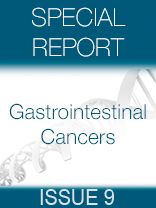ctDNA Positivity Could Spell Higher Risk of Recurrence in Early-Stage Colon Cancer
Circulating tumor DNA (ctDNA) detection has 48% sensitivity and 100% specificity in the prediction of radiologic recurrence at 36 months in postoperative patients with stage II colon cancer.
Bert Vogelstein, MD
Circulating tumor DNA (ctDNA) detection has 48% sensitivity and 100% specificity in the prediction of radiologic recurrence at 36 months in postoperative patients with stage II colon cancer, according to a study recently published inScience Translational Medicine.
Based on findings from the study, the authors believe that a ctDNA liquid biopsy test for residual disease could determine the risk of colon cancer recurrence above current radiologic tests and clinicopathological risk features.
“This new study gets us one major step closer to the real goal [of a more effective test for the detection, monitoring, and treatment of cancer], because it suggests that [ctDNA] can detect residual disease in early-stage patients well before conventional clinical or radiologic criteria can,” Bert Vogelstein, MD, co-director of the Ludwig Center at Johns Hopkins and one of the study’s authors, said in a statement.
The study enrolled 250 patients and 1047 plasma samples were collected from 231 eligible patients, of which 230 patients were evaluable based on the detection of at least 1 somatic mutation. Of the 230 patients, 34 (14.8%) experienced disease recurrence.
Tumor-specific mutations were detected (ctDNA-positive) in the plasma of 20 patients (8.7%) 4 to 10 weeks following surgery using personalized Safe-SeqS assays. Three-year recurrence-free survival (RFS) estimates were 0% for the ctDNA-positive group and 90% for the ctDNA-negative group. However, an additional 16 of 164 patients (9.8%) experienced disease recurrence but were ctDNA-negative.
Testing for carcinoembryonic antigen (CEA) elevation is the current clinical method for predicting radiologic recurrence. However, this biomarker appears to have less sensitivity and specificity than ctDNA. At the time of radiologic recurrence, ctDNA detection was more frequently positive than CEA elevation, according to serial ctDNA and CEA values collected from 27 of 34 recurrent patients up until the point of recurrence. Twenty-three patients (85%) were ctDNA-positive while 11 (41%) had elevated CEA levels as of recurrence (P= .002).
There was also a longer time period between the point of ctDNA detection and radiologic recurrence (median 167 days) than between the point of CEA elevation and radiologic recurrence (median 61 days) (P= .04).
Various clinicopathological features, such as high T stage, lymphovascular invasion, and mismatch repair (MMR) deficient status, have all been used to define whether a patient with colorectal cancer (CRC) has a high or low risk for disease recurrence. However, postoperative ctDNA status had a greater association with poorer RFS rates than any clinicopathological variable.
The status of ctDNA detection had a higher prognostic impact on the RFS risk estimates for patients with low (HR, 28; 95% CI, 8.1-93;P= 9.2 x 10-8) and high risk (HR, 7.5; 95% CI, 2.6-22;P= .00002) based on clinicopathologic risk assessment.
Study authors also noted a higher specificity for ctDNA testing over computed tomography (CT) scans, the current radiologic method for testing for recurrence, as less tumor bulk is required for ctDNA detection than for a CT scan.
Potential Biomarker of Response to Adjuvant Chemotherapy
The detection of ctDNA could also be used as a possible biomarker for a patient’s response to adjuvant chemotherapy.
Adjuvant postoperative chemotherapy is usually offered to higher-risk stage II patients with CRC because they are expected to experience more benefit than those at a lower risk of recurrence. Fifty-two of the evaluable patients (23%) had received adjuvant chemotherapy and, of these, 7 patients (13%) experienced disease recurrence.
Positive ctDNA status following chemotherapy was associated with a higher risk of recurrence (HR, 11; 95% CI, 1.8-68;P= .001). Six of the patients treated with chemotherapy (11%) had detectable ctDNA postoperatively. Five patients started with a ctDNA-positive status at the start of chemotherapy treatment but their status changed to negative while on treatment. Two of these patients became ctDNA-positive again after stopping chemotherapy, while 2 patients remained recurrence free. The fifth patient had radiologic recurrence even though the ctDNA status was negative.
Study authors suggested that ctDNA should not be used as an indicator of recurrence risk as ctDNA detection is not a perfect indicator of residual disease.
“ctDNA measurements should therefore be considered not as a conventional biomarker of recurrence risk but more like a staging test such as a CT scan,” the authors noted.
Its analytical sensitivity could be improved, however, as the study authors suggested, by studying multiple mutations in a single assay rather than analyzing 1 mutation per patient.
There is a possibility that ctDNA could be a real-time marker of response to adjuvant chemotherapy, but this must be validated in a larger cohort of patients.
The small amount of participating patients with detectable postoperative ctDNA greatly restricted findings, as there was a limited ability to detect direct associations between ctDNA status and conventional high-risk clinicopathological factors. The use of ctDNA as a biomarker of disease recurrence and response to chemotherapy will depend upon further study in a more specific and larger pool of patients.
Reference:
Tie J, Wang Y, Tomasetti C, et al. Circulating tumor DNA analysis detects minimal residual disease and predicts recurrence in patients with stage II colon cancer [Published online July 6, 2016].Sci Transl Med.2016. doi: 10.1126/scitranslmed.aaf6219.

Survivorship Care Promotes Evidence-Based Approaches for Quality of Life and Beyond
March 21st 2025Frank J. Penedo, PhD, explains the challenges of survivorship care for patients with cancer and how he implements programs to support patients’ emotional, physical, and practical needs.
Read More